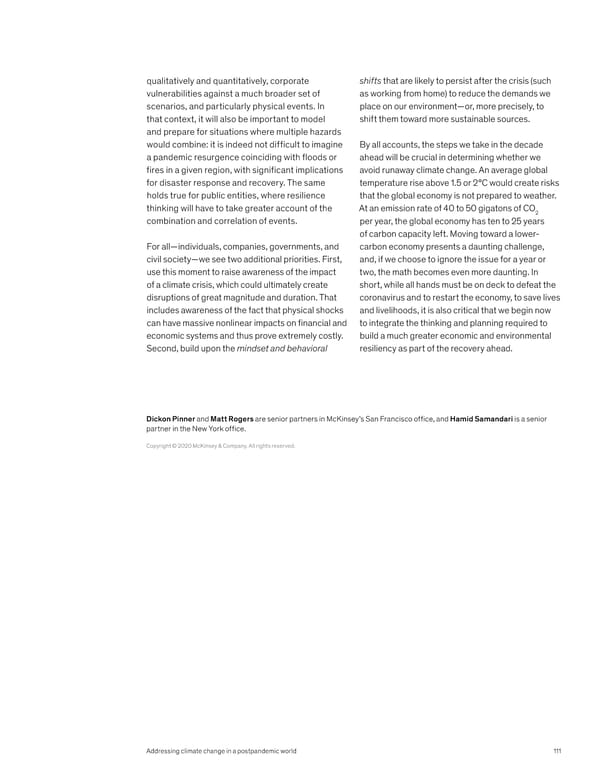qualitatively and quantitatively, corporate shifts that are likely to persist after the crisis (such vulnerabilities against a much broader set of as working from home) to reduce the demands we scenarios, and particularly physical events. In place on our environment—or, more precisely, to that context, it will also be important to model shift them toward more sustainable sources. and prepare for situations where multiple hazards would combine: it is indeed not difficult to imagine By all accounts, the steps we take in the decade a pandemic resurgence coinciding with floods or ahead will be crucial in determining whether we fires in a given region, with significant implications avoid runaway climate change. An average global for disaster response and recovery. The same temperature rise above 1.5 or 2°C would create risks holds true for public entities, where resilience that the global economy is not prepared to weather. thinking will have to take greater account of the At an emission rate of 40 to 50 gigatons of CO2 combination and correlation of events. per year, the global economy has ten to 25 years of carbon capacity left. Moving toward a lower- For all—individuals, companies, governments, and carbon economy presents a daunting challenge, civil society—we see two additional priorities. First, and, if we choose to ignore the issue for a year or use this moment to raise awareness of the impact two, the math becomes even more daunting. In of a climate crisis, which could ultimately create short, while all hands must be on deck to defeat the disruptions of great magnitude and duration. That coronavirus and to restart the economy, to save lives includes awareness of the fact that physical shocks and livelihoods, it is also critical that we begin now can have massive nonlinear impacts on financial and to integrate the thinking and planning required to economic systems and thus prove extremely costly. build a much greater economic and environmental Second, build upon the mindset and behavioral resiliency as part of the recovery ahead. Dickon Pinner and Matt Rogers are senior partners in McKinsey’s San Francisco office, and Hamid Samandari is a senior partner in the New York office. Copyright © 2020 McKinsey & Company. All rights reserved. Addressing climate change in a postpandemic world 111
 What Now? Page 112 Page 114
What Now? Page 112 Page 114